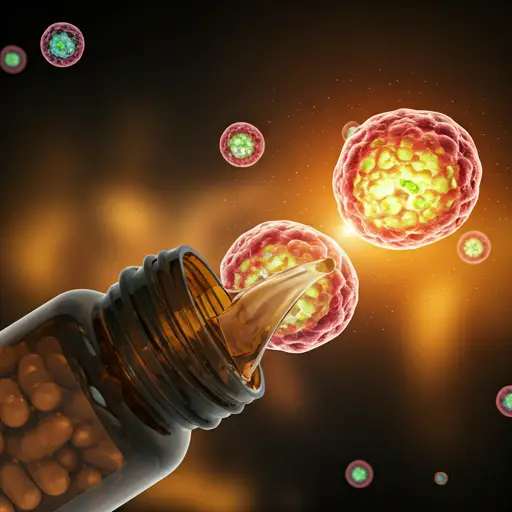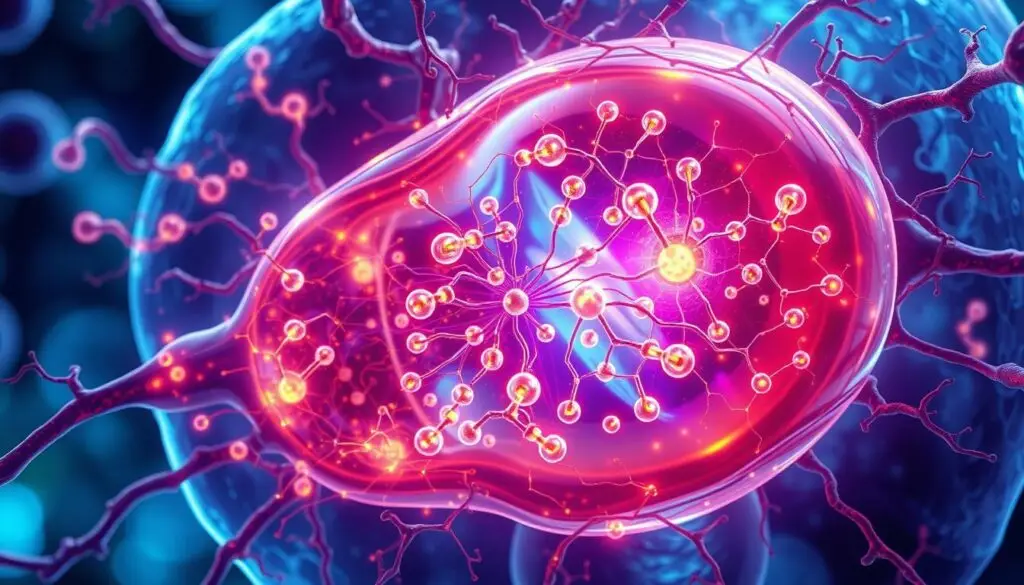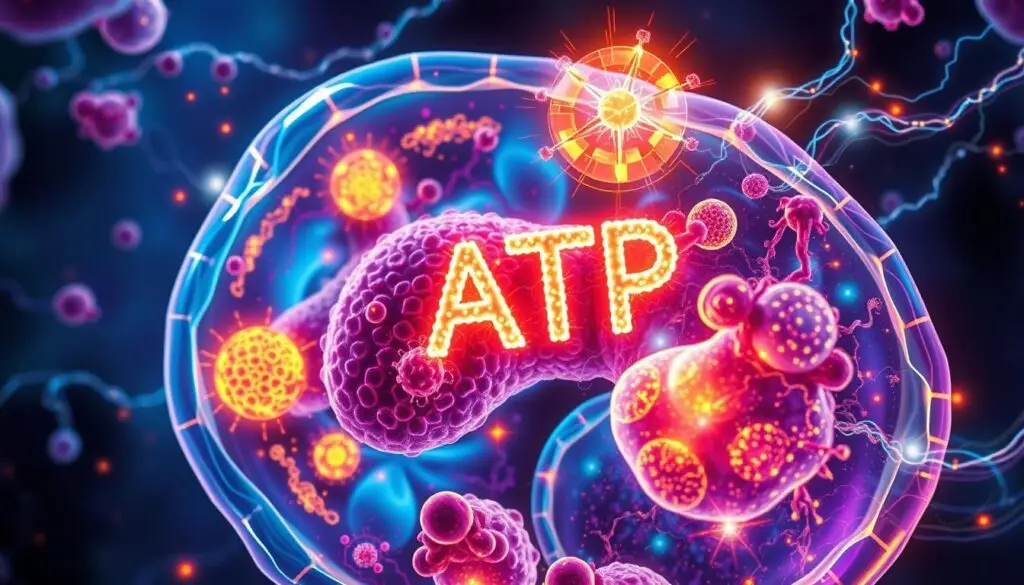Miracle Ways to Improve Your Mitochondrial Function
Reflecting on my health journey, I’m grateful for mitochondria’s power. These tiny organelles in our cells are crucial for our well-being. For years, I battled chronic fatigue and brain fog, feeling drained and disconnected.
Exploring mitochondrial health revealed the answers I sought. Mitochondria are our cells’ powerhouses, creating energy for our bodies. When they falter, health issues follow. Yet, simple lifestyle changes can boost mitochondrial function, enhancing our vitality.
Click here to get more information about Mitochondrial Function

This guide delves into the world of mitochondria. We’ll discuss signs of poor function and effective strategies for better health. Whether facing chronic fatigue or neurodegenerative conditions or seeking boundless energy, you’ll find valuable insights here.
You’ll like this
- What is the best hydrogen water bottle
- 7 Amazing Benefits Of Moringa Leaf Powder You Need To Know
- Neocell Super Powder Collagen Type 1 Benefits Review
Key Takeaways
- Mitochondria are the powerhouses of our cells, responsible for generating the energy-rich molecule ATP that fuels our bodies.
- When mitochondrial function is suboptimal, it can lead to a range of health issues, including chronic fatigue, brain fog, and neurodegenerative conditions.
- Through simple, science-backed lifestyle changes, we can unlock the true potential of our mitochondria and experience a renewed sense of vitality and well-being.
- This comprehensive guide will explore the world of mitochondria, uncover common signs of poor function, and dive into the most effective strategies for optimizing mitochondrial health.
- Whether you’re struggling with chronic health issues or simply want to maximize your energy and performance, the insights in this article will empower you to take control of your mitochondrial health.
Understanding Mitochondria: The Powerhouse of Your Cells
Mitochondria are called the “powerhouses” of our cells. They play a key role in making energy for our cells. They turn the food we eat into energy called adenosine triphosphate (ATP).
Basic Structure and Function of Mitochondria
Mitochondria have a double membrane. The inner membrane is folded into cristae, which help make ATP. Inside, the matrix holds enzymes and genetic material for making ATP.
Why Mitochondrial Health Matters
Our mitochondria’s health is key to our well-being. Problems with mitochondria can cause mitochondrial disease symptoms like fatigue and muscle weakness. Keeping our mitochondria working well is vital for our cells’ energy.
The Role of ATP Production
Mitochondria mainly make ATP, our cells’ energy source. They use nutrients’ energy to create lots of ATP. This energy powers our cells’ functions.
“Mitochondria are the powerhouses of the cell, responsible for generating the vast majority of the cell’s supply of adenosine triphosphate (ATP), used as a source of chemical energy.” – National Institutes of Health

- Easy to Use
- 100% Natural Ingredients
- Non-GMO
- No side effects
Common Signs of Poor Mitochondrial Function
Mitochondrial diseases show up in many ways, affecting people’s lives greatly. Symptoms vary by disease type and severity. Yet, some signs often point to mitochondrial problems.
Fatigue is a big symptom of mitochondrial disease. People with these diseases often feel very tired, even for simple tasks. Muscle weakness, pain, and trouble exercising are also common. This is because muscles need energy from healthy mitochondria to work right.
Neurological symptoms like seizures, developmental delays, and brain problems can also show mitochondrial issues. The brain needs energy from mitochondria to function well. When this energy is lacking, brain problems can occur.
Gastrointestinal issues like chronic diarrhea, nausea, and vomiting are also signs. The digestive system needs a lot of energy, which mitochondria provide. Without it, digestive problems can happen.
It’s important to remember that not everyone with mitochondrial disease shows the same symptoms. The severity can vary a lot. Celebrities like Selma Blair, Jaime King, and Yvette Nicole Brown have spoken out about their struggles. This helps raise awareness and understanding of these complex conditions.
If you think you or a loved one might have mitochondrial disease, see a doctor. Early diagnosis and treatment can greatly improve life quality.
Knowing the common signs of mitochondrial problems can help people take action. This can lead to better cellular and overall health.
The Link Between Lifestyle and Mitochondrial Health
Our lifestyle choices greatly affect our mitochondria’s health. Mitochondria are the powerhouses of our cells. What we eat and how we move and rest can help or harm them.
Impact of Diet on Mitochondria
The food we eat is key to our mitochondria’s function. Eating foods rich in antioxidants, healthy fats, and vitamins helps our mitochondria work better. But, eating too much processed food, sugar, and unhealthy fats can hurt them.
Exercise and Mitochondrial Function
Exercise is a great way to boost mitochondrial health. Activities like running, lifting weights, and HIIT help create new mitochondria. They also make our cells more efficient at making energy.

- Easy to Use
- 100% Natural Ingredients
- Non-GMO
- No side effects
Sleep Quality and Recovery
Good sleep is vital for our mitochondria. Sleep helps our bodies repair and grow, supporting our mitochondria. Not getting enough sleep can harm our mitochondria and lead to health problems.
By choosing a healthy lifestyle, we can improve our cells’ function. This leads to more energy, better health, and happiness. Using natural ways to how to improve mitochondrial function naturally can change our lives for the better.
Embrace Dietary Changes
Eating a diet full of nutrients is vital for your mitochondria. Eat whole, unprocessed foods that are rich in antioxidants, healthy fats, and nutrients that support mitochondria. Include leafy greens, berries, fatty fish, and nuts to feed your cells and boost mitochondrial function.
Engage in Regular Exercise
Exercise is a great way to improve your mitochondria. Aerobic activities like brisk walking, jogging, or cycling can increase your mitochondria’s number and efficiency. This leads to better energy production and overall health.
Optimize Sleep and Recovery
Getting enough sleep and recovery is crucial for your mitochondria. Aim for 7-9 hours of quality sleep each night. Also, use relaxation techniques like meditation or gentle yoga to help your body repair and rejuvenate.
Supplement with Targeted Nutrients
Some vitamins, minerals, and antioxidants can help your mitochondria. Adding CoQ10, alpha-lipoic acid, and omega-3 fatty acids to your routine can nourish your cells and improve mitochondrial function.
“Improving mitochondrial function is the key to unlocking boundless energy, enhanced cognitive abilities, and overall vibrant health.”
By following these miracle ways, you can unlock more energy, focus, and vitality. Add these strategies to your life and see the amazing changes for yourself.

Essential Nutrients for Optimal Mitochondrial Performance
Keeping your mitochondria in top shape is key to staying healthy. Luckily, there are important nutrients that help these energy centers work better. Let’s explore the vitamins, minerals, antioxidants, and fatty acids that boost mitochondrial function naturally.
Key Vitamins and Minerals
Some vitamins and minerals are vital for healthy mitochondria. For example, vitamin B1 (thiamine) and vitamin B2 (riboflavin) help turn food into energy. Magnesium is also crucial, as it helps make ATP, the cell’s energy source.
Antioxidants and CoQ10
Mitochondria face oxidative stress, which can harm them. Antioxidants like Coenzyme Q10 (CoQ10) are key. They help make ATP and shield against damage from free radicals.
Omega-3 Fatty Acids
Omega-3 fatty acids, found in fatty fish, support mitochondrial health. These fats boost energy production and cut down inflammation. Both are vital for mitochondria to work at their best.

- Easy to Use
- 100% Natural Ingredients
- Non-GMO
- No side effects
| Nutrient | Benefits for Mitochondrial Health |
|---|---|
| Vitamin B1 (Thiamine) | Supports energy production and mitochondrial function |
| Vitamin B2 (Riboflavin) | Assists in the conversion of food into usable energy |
| Magnesium | Involved in ATP production and mitochondrial function |
| Coenzyme Q10 (CoQ10) | A powerful antioxidant that protects mitochondria from oxidative stress |
| Omega-3 Fatty Acids | Improve energy production efficiency and reduce inflammation |
Adding these nutrients to your diet can boost your mitochondria’s performance. This supports your cells’ energy production and overall health.
Exercise Protocols for Enhanced Mitochondrial Efficiency
Keeping your mitochondria healthy is key to feeling good. There are special workouts that can naturally boost your mitochondria’s performance. Let’s look at some top exercises to improve your mitochondrial function.
High-Intensity Interval Training (HIIT)
HIIT workouts are great for making more mitochondria. They involve short, intense exercises followed by rest or easier activities. This pushes your mitochondria to work better at making ATP, your cells’ main energy source.
Resistance Training
Strength exercises like weightlifting or bodyweight routines also help your mitochondria. Resistance training makes your muscles work harder. This increases the need for energy, leading to more and better mitochondria over time.
Endurance Exercise
Long activities like running, cycling, or swimming are also good. Endurance exercise helps your mitochondria grow. This makes them better at producing ATP for your workouts and daily life.
| Exercise Type | Benefits for Mitochondrial Function |
|---|---|
| High-Intensity Interval Training (HIIT) | Stimulates mitochondrial biogenesis, increases energy production efficiency |
| Resistance Training | Challenges muscles, leading to increased mitochondrial number and efficiency |
| Endurance Exercise | Promotes mitochondrial growth and development, enhances ATP production |
Adding these exercises to your routine can naturally improve your mitochondrial function. You’ll see better energy, metabolic health, and overall well-being.
“Regular exercise is one of the most effective ways to improve mitochondrial function and overall energy production in the body.”
Dietary Strategies to Boost Mitochondrial Health
Improving your diet is a great way to naturally boost mitochondrial function. This can lead to better energy production at the cellular level. Let’s look at some dietary strategies that help support mitochondrial health.
Ketogenic Diet Benefits
The ketogenic diet focuses on high fats and low carbs. It helps mitochondria work more efficiently. By using ketones instead of glucose, this diet boosts ATP production and cuts down on oxidative stress.
Intermittent Fasting Approach
Intermittent fasting involves alternating between fasting and eating. It improves mitochondrial function by triggering metabolic changes. These changes include more mitochondria and better cellular repair, leading to healthier mitochondria.
Optimal Food Choices
- Eat a variety of whole foods rich in nutrients like coenzyme Q10, omega-3s, and antioxidants.
- Choose healthy fats from avocados, nuts, seeds, and fatty fish to fuel mitochondria.
- Include lots of leafy greens for magnesium and other minerals crucial for mitochondrial function.
By adding these dietary strategies to your life, you can naturally improve mitochondrial function. This supports the health and efficiency of your body’s energy-producing mitochondria.

- Easy to Use
- 100% Natural Ingredients
- Non-GMO
- No side effects
Environmental Factors Affecting Mitochondrial Function
Our environment is key to keeping our mitochondria healthy. Toxins, stress, and pollution can harm these cellular powerhouses. It’s important to know how our surroundings affect our mitochondria to improve our health and fight mitochondrial disease.
Toxins like heavy metals and pesticides can mess with mitochondria, reducing ATP and causing stress. Stress, both physical and mental, also hurts these organelles. Plus, pollutants in the air and water can make mitochondria work poorly, worsening health issues.
- Minimize exposure to toxic chemicals and pollutants by using natural cleaning products, filtering air and water, and choosing organic foods whenever possible.
- Engage in stress-reducing activities like meditation, yoga, or deep breathing exercises to support mitochondrial resilience.
- Ensure adequate rest and recovery to allow your mitochondria to recharge and function at their best.
By addressing environmental factors, we can keep our mitochondria working well. This can boost our health and well-being.

“Protecting our mitochondria from environmental stressors is crucial for preserving their ability to power our cells and support our overall health.”
Supplements and Natural Compounds for Mitochondrial Support
Supplements and natural compounds can help improve mitochondrial function naturally. Many studies have looked into how different nutrients and substances support these cellular powerhouses. They aim to boost their health and efficiency.
Research-Backed Supplements
Several supplements have shown promise in enhancing mitochondrial function. Here are a few:
- Coenzyme Q10 (CoQ10) – This essential nutrient is crucial for energy production. It acts as an antioxidant, protecting mitochondria from oxidative stress.
- Alpha-lipoic acid (ALA) – ALA is a powerful antioxidant. It improves mitochondrial function and boosts key enzymes involved in energy metabolism.
- Nicotinamide adenine dinucleotide (NAD+) – NAD+ is a cofactor essential for mitochondrial function. It supports their biogenesis or the creation of new mitochondria.
- Creatine – Creatine enhances mitochondrial function, especially in muscle cells. It improves energy production and exercise performance.
Dosage Recommendations
Following the right dosage is key when supplementing with these compounds. CoQ10 is usually taken at 100-300 mg per day. ALA is often recommended at 300-600 mg daily. NAD+ supplements are typically taken at 250-500 mg per day, and creatine at 3-5 grams per day.
Always talk to a healthcare professional before starting any new supplement regimen. They can help you find the right dosage and combination. This ensures you get the most benefits for your mitochondrial health.
Real Stories: Living with Mitochondrial Disease
Mitochondrial diseases are complex and often misunderstood. They can deeply affect a person’s life. Yet, the stories of those living with these challenges offer hope and resilience. Let’s look at the real-life experiences of a few individuals who have faced the ups and downs of mitochondrial disease.
Selena Gomez, the famous singer and actress, has battled lupus. Lupus is an autoimmune disease that can impact mitochondrial function. “It’s been a journey,” Selena said. “But I’m learning to manage my mitochondrial disease symptoms and find ways to maintain my health and well-being.”
Toni Braxton, the Grammy-winning R&B artist, was diagnosed with mitochondrial disease in her 40s. This explained her chronic fatigue and muscle weakness. “I had to learn to listen to my body and pace myself,” she said. “But with the right support and treatment, I’ve been able to continue pursuing my passion for music.”
“I had to learn to listen to my body and pace myself. But with the right support and treatment, I’ve been able to continue pursuing my passion for music.”
These stories are just a few examples of celebrities with mitochondria disease who have shared their experiences. Their journeys remind us that mitochondrial diseases can affect anyone, no matter their fame or fortune. By sharing their stories, they inspire others to advocate for their health, seek the right support, and find ways to thrive despite the challenges they face.

The journey of managing a mitochondrial disease is long and hard. But these stories show the incredible resilience and determination of those living with these conditions. Their experiences remind us that, with the right mindset and resources, it is possible to not just survive, but to truly live with mitochondrial disease.
Conclusion
As we wrap up this journey, it’s clear that keeping mitochondria in top shape is key to our health. We’ve seen how important it is to support their work in making energy for our cells.
We’ve looked at ways to improve mitochondrial function naturally. This includes eating right and exercising in ways that boost our cells. Doing these things can improve our health and unlock our cells’ full potential.
Remember, making small daily changes can greatly affect our mitochondrial health. This, in turn, boosts our physical and mental strength. Use this knowledge how to improve mitochondrial function naturally. Your body and mind will be grateful for your efforts to keep them healthy.

- Easy to Use
- 100% Natural Ingrediants
- Non-GMO
- No side effects
FAQ
What are mitochondria and why are they important?
Mitochondria are called the u0022powerhousesu0022 of our cells. They make most of our body’s energy, in the form of ATP. Keeping them healthy is key for our energy and overall health.
What are the signs of poor mitochondrial function?
Signs of poor mitochondrial function include chronic fatigue and muscle weakness. You might also see neurological issues, digestive problems, and heart and kidney disorders. Celebrities like Selma Blair and Yvette Nicole Brown have talked about their struggles with mitochondrial diseases.
How can I naturally improve my mitochondrial function?
To boost mitochondrial health, try a ketogenic or calorie-restricted diet. Regular exercise and quality sleep are also important. Eating antioxidants, CoQ10, and omega-3 fatty acids can help too.
What environmental factors can impact mitochondrial function?
Toxins, chronic stress, and air pollution can harm mitochondria. Try to avoid these stressors. Also, detoxification practices can support your mitochondria’s health.
Are there any supplements that can boost mitochondrial performance?
Yes, supplements like CoQ10, alpha-lipoic acid, NAD+, and PQQ might help. Always talk to a healthcare professional before starting any supplements to ensure safety and the right dosage.








